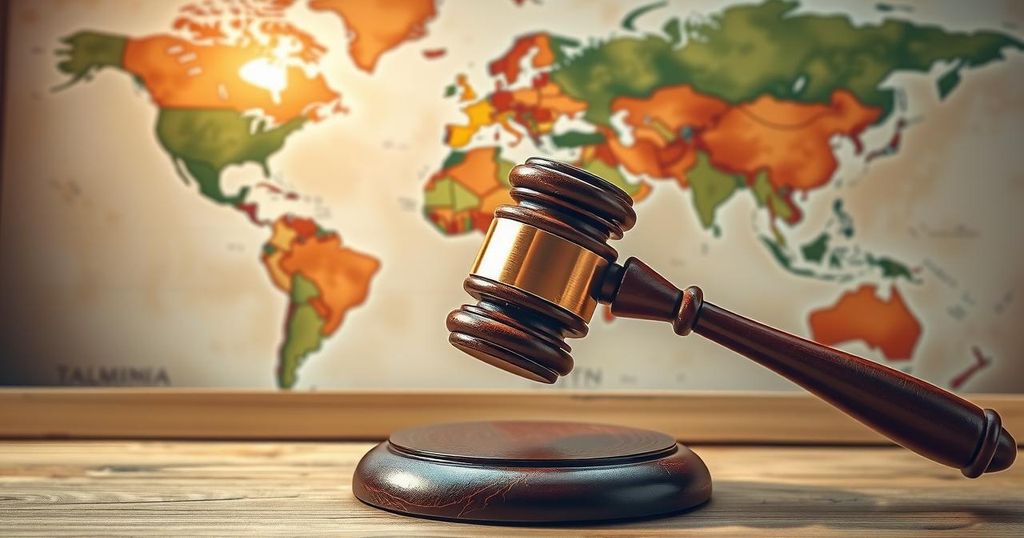Sudan has filed a case against the UAE at the International Court of Justice, alleging complicity in genocide through support for the Rapid Support Forces. Sudan accuses the UAE of breaching the Genocide Convention, citing evidence of RSF atrocities. The case emphasizes the need for support from the Global South and highlights concerns over international justice and accountability for powerful states.
The International Court of Justice (ICJ) recently announced that Sudan has initiated legal proceedings against the United Arab Emirates (UAE), accusing it of complicity in genocide due to its support for the Rapid Support Forces (RSF). This paramilitary group has engaged in violent confrontations with the Sudanese Armed Forces (SAF) since April 2023, contributing to allegations of war crimes. Sudan’s case emphasizes the RSF’s atrocities against the Masalit ethnic group, including massacres and widespread displacement of civilians, echoing the notorious Darfur conflict of the early 2000s.
Evidence highlights the UAE’s potential violation of the Genocide Convention, suggesting that the UAE’s backing of the RSF constitutes complicity in their violent actions. Reports from credible organizations, such as the Raoul Wallenberg Centre for Human Rights and Human Rights Watch, detail systematic killing, sexual violence, and the destruction of entire villages in West Darfur, further substantiated by satellite imagery analysis from Yale’s Humanitarian Research Lab.
The United Nations corroborates these allegations through reports of mass graves linked to recent RSF attacks, with survivor testimonies indicating that RSF fighters specifically targeted the Masalit people based on ethnicity. The U.S. State Department’s recent classification of RSF actions as genocide aligns with these findings, underscoring the severity of the situation.
Investigations reveal that the UAE has been supplying arms to the RSF, with credible evidence detailing weapon transfers through Chad’s Amdjarass base. Flight tracking and satellite data confirm numerous flights between the UAE and RSF-linked territories, raising concerns about the UAE’s involvement in exacerbating the conflict in Sudan.
The geopolitical landscape complicates Sudan’s plight, as the UAE’s economic power far surpasses Sudan’s. With a GDP of $569 billion compared to Sudan’s $30 billion, the UAE possesses significant financial and diplomatic influence. Recent actions of U.S. lawmakers to block arms sales to the UAE underscore the gravity of the situation, as the UAE has reportedly reneged on commitments to halt support for the RSF.
The ongoing conflict in Sudan is a stark reminder of global neglect and manipulation by external forces that exacerbate the humanitarian crisis. The challenges faced by Sudan may not have the moral leverage seen with South Africa’s case against Israel, but they highlight the critical need for support from other nations in the Global South. Failure to support Sudan’s ICJ case risks undermining principles of international justice and could perpetuate inequalities in the application of international law.
Support for Sudan’s case must be founded on principles of accountability, rather than uncritical support for the Sudanese government. While the SAF has its own troubled history, the focus should remain on holding the UAE accountable for its actions. Strengthening international legal frameworks and ensuring that states face consequences for their roles in human rights violations is paramount to restoring faith in the international justice system.
A favorable ruling for Sudan could enhance the credibility of the ICJ and reaffirm global commitments to uphold principles of justice. However, the UAE’s expected defense, citing reservations to the Genocide Convention, poses significant procedural challenges. Previous legal opinions indicate that such reservations could contradict the spirit of the convention, suggesting a pathway for accountability.
Ultimately, the absence of unified support for Sudan risks creating a vacuum that invites exploitation from more powerful actors, deepening the suffering of South Sudanese victims amidst political and military geopolitics. Ignoring Sudan’s plight may diminish international responses to human rights abuses, allowing power dynamics to supersede accountability in global affairs.
In summary, the Global South is urged to support Sudan’s case against the UAE at the International Court of Justice amid grave allegations of genocide and complicity by the UAE. This case not only highlights the urgent need for accountability for powerful states but also reflects the broader issues of international justice and solidarity amongst postcolonial nations. The outcome may significantly impact the integrity of the international justice system and the practical application of human rights protections worldwide.
Original Source: foreignpolicy.com






